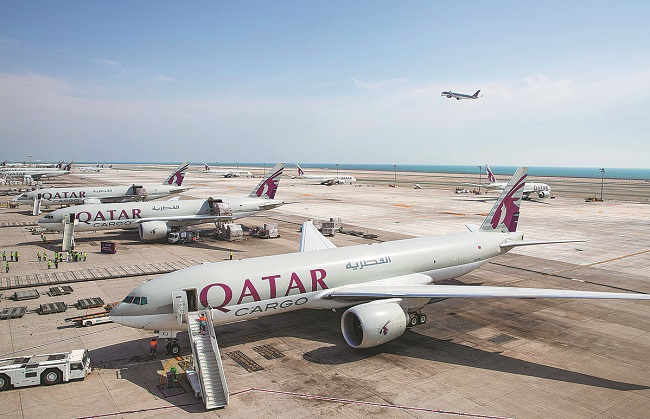
Qatar Airways Cargo planes park at Hamad International Airport in Doha, Qatar, in May. The carrier's extensive operations in China helped boost its business performance. [Provided to China Daily]
Qatar Airways Cargo, the cargo unit of the national airline of Qatar, was listed as the No 3 carrier in terms of schedule cargo ton-kilometers flown last year, behind Federal Express and UPS. The carrier's extensive operations in China have helped greatly in boosting its business performance.
Last year, Doha-based Qatar Airways became the first Middle Eastern carrier to resume belly-hold operations to all of its destinations in China, leveraging its fleet of 250 aircraft. The carrier said its four freighter routes that connect Doha with Guangzhou, Guangdong province, Shanghai, Hong Kong and Macao have been robust.
The carrier added belly-hold cargo capacity to China and expanded services to Beijing, Chongqing, Chengdu, Sichuan province, and Hangzhou, Zhejiang province. The belly-hold cargo flights were operated on a turnaround basis, assuming the routes' previously assigned flight numbers and frequencies, without any cabin crew members and passengers on board.
In 2020, Qatar Airways also resumed passenger services from Guangzhou and Hangzhou to Doha. With the resumption of passenger flights, Qatar Airways has more than 60 flights in total going in and out of the Chinese mainland weekly. Those flights comprise passenger freighters, belly-hold cargo flights and freighters.
Besides, the company is skilled in the handling of temperature-sensitive pharmaceuticals and perishable cargo, as well as transporting live animals and time-critical shipments.
In addition, with the booming growth in the economy of the Guangdong-Hong Kong-Macao Greater Bay Area, the region becomes increasingly interconnected through overland connections such as the Hong Kong-Zhuhai-Macao Bridge. Air cargo operations have also received a boost in demand, Qatar Airways said.
That demand for transportation of the Greater Bay Area's major exports is strong, and those products include electronics, garments and e-commerce goods. Imports mainly consist of general consumer goods to be dispersed throughout the region.
Globally, utilizing a freighter fleet of Boeing B747-8, B777 and B777-300ER mini freighters, along with the belly-hold transportation of the carrier's passenger fleet, it delivers goods to more than 140 business and leisure destinations on some 250 aircraft.
Since December, Qatar Airways Cargo started transporting COVID-19 vaccines. As of April, it had transported nearly 20 million doses of vaccines to 24 countries.
For transporting vaccines and other medical products, the carrier said it provides controlled cool chain and dedicated monitoring, intervention and servicing, and proactive re-icing at its Doha hub. The carrier has one of the most sophisticated cargo terminals in the industry in Doha, and it has become a platform for the expansion of its global freight business.
Meanwhile, the United Arab Emirates' Etihad Airways, another carrier based in the Middle East, said it saw strong results in cargo operations in the first half, and the cargo business is continuing to play a critical role in facilitating international trade.
The Abu Dhabi-based airline said it has temporarily modified five Boeing B777 aircraft to support cabin loading. In the first half of this year, it operated more than 430 charter and scheduled cargo flights using the new configuration.
The airline said it has carried tons of crucial vaccine shipments in support of global vaccination efforts. As of Aug 10, it had handled more than 65 million units of vaccines across 40 countries in the Middle East, Africa, Europe, Asia and South America.
In the first six months, the airline's temperature-controlled air cargo solution for pharmaceuticals saw a 94 percent year-on-year increase in shipments.
During the period, the decline in passenger revenue was offset by its strong performance in cargo operations, with a 44 percent year-on-year increase in freight volume carried and a 56 percent year-on-year rise in revenue, the carrier said.
"While market demand has been slower to recover than anticipated, our record cargo performance has continued to buoy the business," said Adam Boukadida, chief financial officer of Etihad Airways.